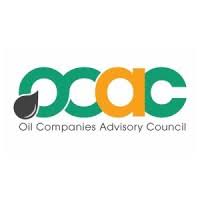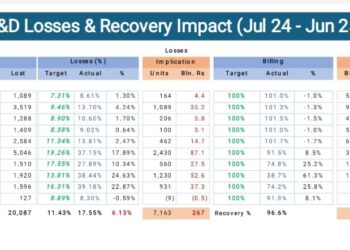ISLAMABAD: The Oil Companies Advisory Council (OCAC) has submitted a budget proposal for the fiscal year 2025-26 suggesting a number measures to protect the oil industry which is crisis due to government’s policies.
The budget proposals for the fiscal year 2025-26 are as follows:
Removal of Sales Tax Exemption; The Finance Act 2024 introduced exemption of sales tax on Motor Spirit (Petrol), High Speed Diesel Oil, Kerosene, and Light Diesel Oil. Previously these products were zero-rated which meant that input sales tax on services was technically claimable against sales of these products but was piling up.
OCAC is of the view that since the pricing of above-mentioned products is regulated, the disallowance of input tax has increased the operating costs as well as cost of infrastructure development of the Industry; impact for TY 2025 is expected to be more than Rs. 33 billion, recommending that petroleum products should be brought into taxability regime.
Abolishment of Super Tax: The current global and local economic challenges have severely impacted organized and ethical businesses. As these businesses brace for a highly challenging operating environment amid a low- growth economy, it is imperative that the Government remains sensitive to the pressures faced by the formal sector.
The excessive tax burden on the formal corporate sector and especially the oil industry, already bearing the brunt of compliance and regulation, requires urgent review to ensure long-term sustainability and competitiveness. Super Tax, originally introduced as a one-time levy, has been extended well beyond its initial scope.
In light of the current economic climate and the need to support documented and responsible businesses, we strongly recommend that the Super Tax be abolished for Tax Year 2025-26.
Minimum Tax Under Section 113 of Income Tax Ordinance: Prices of petroleum products (High Speed Diesel and Motor Spirit – Petrol) and the margins thereon are fixed by the Government of Pakistan and cannot be changed unless approval of the relevant Ministries of the Government is obtained. This fixed margin covers all costs related to establishment, development and set-up of the business and running of the business including capital cost and financial costs, at the current price, the Minimum Tax eats up around 16% of OMCs’ fixed margin.
OCAC has recommended that Minimum Tax applicable on Refineries and OMCS should be reduced to 0.25% and abolished in the subsequent year.
Sales tax on advance receipts: Sales tax on advance receipts against supplies of goods was reintroduced through the Finance Act 2024, this was also made part of law some years ago, however, was withdrawn. OMCS due to their high volume of transactions could not comply with this law at that time and always advocated for its withdrawal.
OCAC said that sales tax on advances by the OMCS is very cumbersome task and it has no revenue benefit to the Government, requesting that sales tax on advances should be withdrawn.
Withdrawal of Commissioner Powers to issue Exemption Certificates: The Commissioner previously had the authority to issue exemption certificates in cases where an individual’s income was exempt from tax or eligible for a 100% tax credit. Additionally, the Commissioner could issue these certificates for payments related to the sale of goods, services rendered, and contract execution by both resident and non-resident individuals, subject to certain conditions. This power was withdrawn through the Finance Act 2024.
OCAC said that since the early 1990s, petroleum products produced by refineries have been exempt from withholding tax under the Income Tax Ordinance 2001, with the Commissioner granting exemptions in accordance with the law. This exemption was provided because, despite the high sales volume of refineries, their profit margins are low. Due to this change, refineries are facing significant withholding tax liabilities without corresponding income to offset it. OCAC has recommended that the Commissioner’s power for issuing Exemption Certificates should be reinstated.
Abolishment of final tax regime on export of goods: The export of goods had been governed by a final tax regime, where the withholding tax collected by Authorized Dealers on the remittance of export proceeds was considered the final discharge of the exporter’s tax liability, regardless of the underlying income or loss. Subsequent to Finance Act 2024, the tax collected from exporters at the rate of 1% is being treated as a minimum tax. This change in the tax regime means that exporters are now liable to pay super tax, unlike the previous system where their income, being subject to final tax, was exempt from this additional tax.
OCAC has argued that due to low domestic consumption of certain refinery products, such as FFO and Naphtha, refineries are compelled to export these products. Exporting these products not only brings valuable foreign exchange to the country but also ensures the continuous operation of refineries, enabling the production of other essential products like HSD and PMG to meet local demand. In light of this, it has recommended that the final tax regime on export is reinstated.
Disallowance of Royalty Payments: The Finance Act 2024 has introduced a 25% disallowance on sales promotion and advertising expenses when a company has a royalty arrangement with an associated entity for certain intangibles. This restriction increases the company’s tax liability, discourages foreign investment, and negatively impacts businesses operating under the multinational corporation (MNC) model in Pakistan.
Withdrawal of Tax Exemption on Subsidy Income: Subsidy income of a person received from Federal Government for the purposes of implementation of any orders of the Federal Government was previously Tax Exempted, however, the exemption has been withdrawn in the Finance Act 2024.
This has adversely effected member companies, it is recommended that tax exemption on Subsidy Income may be reinstated.
Revised Tax Slab Rates for Salaried Individuals: The Finance Act 2024 increased tax slab rates and imposed a 10% surcharge on high earners, significantly raising the tax burden on salaried individuals. While higher tax rates were meant for top earners, the consistent lowering of slab ceilings has pushed mid-level income earners into the highest tax brackets. This impacts disposable income, talent retention, and corporate wage structures.
OCAC has recommended that pre-Finance Act 2024 salary tax structure may be restored, 10% surcharge may be removed, and tax credits and deductions may be reinstated in order to provide relief and support economic stability. Ends














